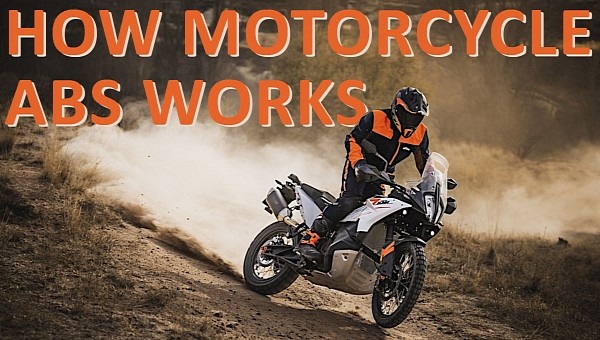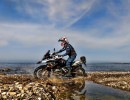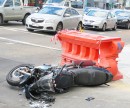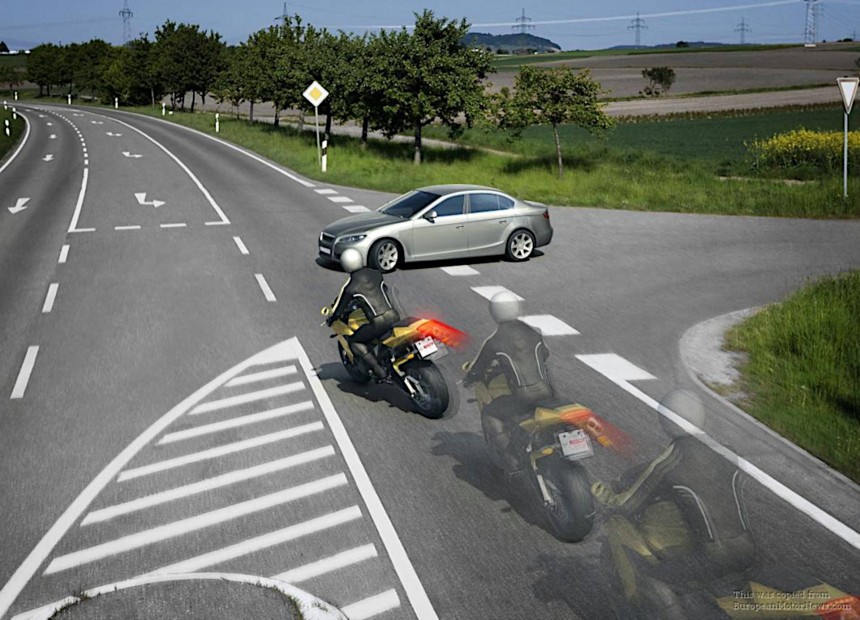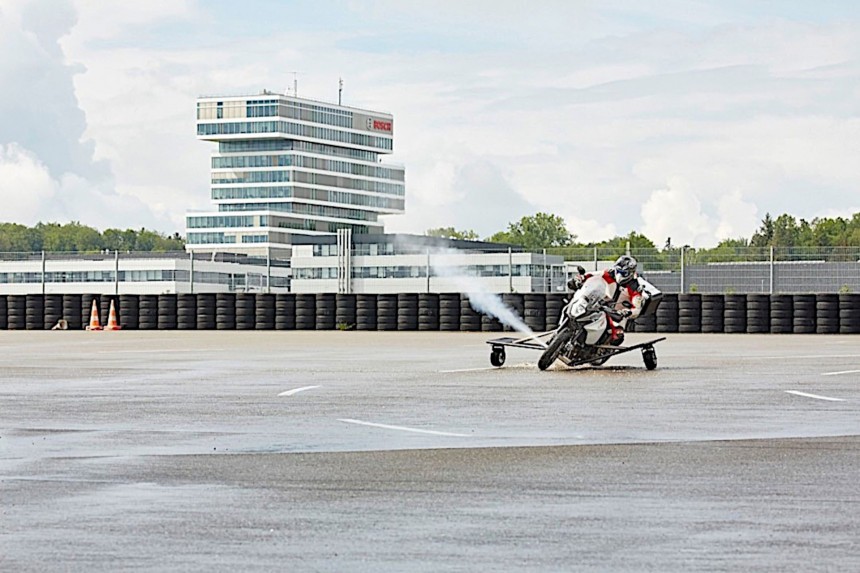Over the years, I've heard many debates regarding the ABS, both for cars and motorcycles, and I came to the conclusion that this system is life-saving equipment, and choosing it is right there with wearing a helmet. It's that important. Still, there are some specific situations when you don't want it active on your motorcycle.
Probably most of you already know what ABS is, but still, I'll detail a little about it for those who don't. ABS, or Anti-locking Braking System, prevents a wheel from locking during hard-braking situations. It actually lowers the pressure so the wheel can spin.
You might think it's a bad idea to lower the pressure when you most need it, but it's not. If a wheel is locked, you have no control whatsoever over the direction it is going to spin: left, right, or forward. I don't have to tell you how bad that is on a motorcycle. If your rear tire spins sideways, you crash. If the front tire is locked and slides left or right, you crash.
The French aviation engineer Voisin invented the system about a century ago for airplanes. Then, in the '60s, the British automaker Jensen made the Healey Interceptor FF, which came with a system developed together with Dunlop that allowed the car to brake and stop without locking the wheels. It wasn't very effective, but it was an important step forward. Later, the German company Bosch developed an electronic version that finally worked well for cars. Soon, other companies followed and developed new systems.
Since the sensors for the entire system are located on the wheel hubs or rotors, they can measure the speed very accurately for each wheel independently. After the speed has decreased lower than a certain value, the wheels are fully locked and the motorcycle stops. While some bikes only have one-wheel ABS, most modern systems have dual-channel ECUs, meaning they receive info from both wheels.
A notable thing must be added: these sensors are detecting the actual speed of the wheels themselves, and not the absolute speed of the motorcycle in relation to the ground: it's exactly this variable that allows the ABS ECU to help detect whether wheel slip will occur in certain situations, as you'll see ahead.
Alongside wheel speed sensors, modern ABS also comprises gyroscopes and handlebar sensors for detecting the leaning angles of the bike. Knowing the bike's lean angle helps present-day ABS provide extended functionality when turning.
On a bike fitted with an anti-locking braking system, the sensors will detect the lock and immediately release the brake pressure on the calipers until the wheel starts spinning again. Since the system sends ten or more impulses per second, you may say that it will be quite accurate. Thus, your chances of not slipping and crashing are diminished. Also, while riding in the rain is inconvenient, sometimes you have no choice. There will be an important grip difference between areas with wet asphalt and potholes filled with water. An ABS-equipped motorcycle will handle braking situations better than one with a classic system.
He discovered that, on average, ABS was linked to a 32 percent crash rate reduction for regular and cruiser motorcycles and a 25 percent drop for touring and sport touring bikes, according to the type of motorbike. However, this number decreased to 19% for sport bikes and to 12% for supersport motorcycles.
By 2020, just about one-quarter of the new motorcycles sold in the U.S. were not fitted with ABS, but fortunately, more than half of the bikes sold had this system installed.
You might think it's a bad idea to lower the pressure when you most need it, but it's not. If a wheel is locked, you have no control whatsoever over the direction it is going to spin: left, right, or forward. I don't have to tell you how bad that is on a motorcycle. If your rear tire spins sideways, you crash. If the front tire is locked and slides left or right, you crash.
The French aviation engineer Voisin invented the system about a century ago for airplanes. Then, in the '60s, the British automaker Jensen made the Healey Interceptor FF, which came with a system developed together with Dunlop that allowed the car to brake and stop without locking the wheels. It wasn't very effective, but it was an important step forward. Later, the German company Bosch developed an electronic version that finally worked well for cars. Soon, other companies followed and developed new systems.
How does it work?
The braking system is connected to a computer that calculates the wheel's speed 100 times per second. When it realizes that if, while braking, the speed goes to zero, it releases part of the brake pressure, so the wheel could spin again. This allows the rider to keep the bike under control. At first, the manufacturers offered the ABS as an option, and its price was around $1000, so there were not too many people willing to pay for that. However, after it became mandatory in Europe, it started to be seen more often on bikes sold in the U.S. because the manufacturers didn't want to spend more money on separate production lines. The first motorcycle fitted with such a system was the 1988 BMW K100.Since the sensors for the entire system are located on the wheel hubs or rotors, they can measure the speed very accurately for each wheel independently. After the speed has decreased lower than a certain value, the wheels are fully locked and the motorcycle stops. While some bikes only have one-wheel ABS, most modern systems have dual-channel ECUs, meaning they receive info from both wheels.
A notable thing must be added: these sensors are detecting the actual speed of the wheels themselves, and not the absolute speed of the motorcycle in relation to the ground: it's exactly this variable that allows the ABS ECU to help detect whether wheel slip will occur in certain situations, as you'll see ahead.
When is the system effective?
You are riding on a nice sunny day, and the road is perfectly dry and clear in front of you. Suddenly, you notice an accident after a curve, and you need to brake hard. You did everything by the book, but then there was an oil patch on the asphalt. Usually, that's a perfect recipe for disaster. On a motorcycle without ABS, the first wheel that will reach that spot will suddenly lock, slip, and you'll crash. And it mustn't be oil. It can be fresh paint too.On a bike fitted with an anti-locking braking system, the sensors will detect the lock and immediately release the brake pressure on the calipers until the wheel starts spinning again. Since the system sends ten or more impulses per second, you may say that it will be quite accurate. Thus, your chances of not slipping and crashing are diminished. Also, while riding in the rain is inconvenient, sometimes you have no choice. There will be an important grip difference between areas with wet asphalt and potholes filled with water. An ABS-equipped motorcycle will handle braking situations better than one with a classic system.
When isn't the ABS good?
On asphalt, the ABS is better. That's something most people agree with. Save for those who just don't want to hear about the modern stuff. But in off-road situations, this system might get in your way. For example, adventure riders use the rear brake to lock the wheel and provoke a slide to tighten a turn. In addition, a locked wheel will dig into soft ground or sand, helping the bike stop quicker. That's why if you are more attracted to such sports, look for a bike with an on/off button for the ABS.What do studies say?
IIHS conducted a study on motorcycles fitted with ABS produced between 2013 and 2019. Eric Teoh, the Director of Statistical Services, only took into account motorcycles that were available with and without ABS, and the results were astonishing. It was proven that bikes with an anti-locking system were involved in 22% fewer fatal accidents than those without it.He discovered that, on average, ABS was linked to a 32 percent crash rate reduction for regular and cruiser motorcycles and a 25 percent drop for touring and sport touring bikes, according to the type of motorbike. However, this number decreased to 19% for sport bikes and to 12% for supersport motorcycles.
By 2020, just about one-quarter of the new motorcycles sold in the U.S. were not fitted with ABS, but fortunately, more than half of the bikes sold had this system installed.
